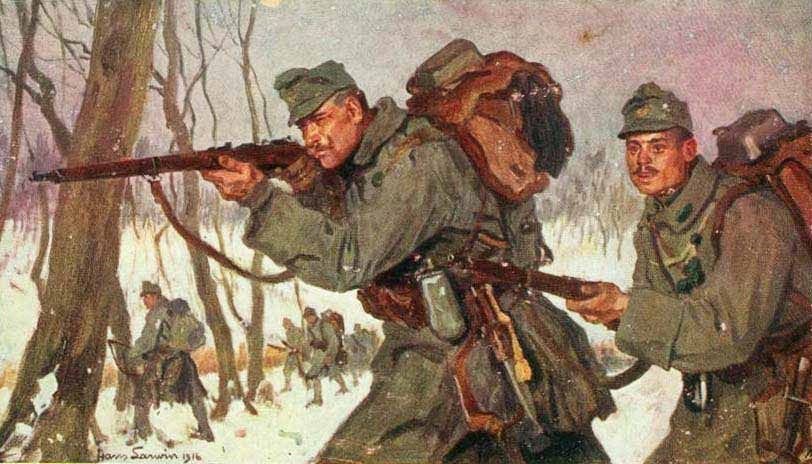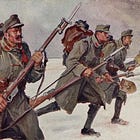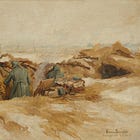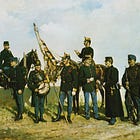Combat Orders (II)
FMS D-0268
This article is the second of a series of four articles that, taken together, provide the full text of a study written by Lothar Rendulic in 1947. The first article in this series can be found below.
Even though the professional training of military leaders has been largely standardized, there are still differences of personality, especially with regard to character traits and temperament. As a rule, the conventional type of combat order hardly ever makes allowance for personality traits, particularly since identical copies of such orders are distributed to several commands. On the other hand, personal or telephone conversations are a medium by which a superior can furnish the necessary guidance to those subordinates whose personalities require it.
At times, however, situations will arise where a combat order must go as far as to make special allowance for the personality of a subordinate. Such situations will mostly occur in instances where one or the other subordinate commander is confronted by a serious predicament or charged with an important assignment. Moreover, a few added words that appeal to the personality of the subordinate, can often lend great emphasis to a combat order.
An example will illustrate the latter point: during the offensive which was mounted on 2 October 1941, the 52nd Division, constituting one wing of the Fourth Army, pushed forward. There were no friendly forces on the division's right. From the Bryansk pocket which was forming to the south, to the Moscow area, the Russians were operating railroad trains on a very limited headway. These trains were operated on a line which ran 50 km to the southeast, diagonal to the division's axis of advance.
It would have taken the division several days to reach the railroad, yet it was imperative to halt enemy traffic on this heavily guarded line as soon as possible. I gave the following order to the commander of the reconnaissance battalion which had been reinforced by combat engineers:
"The reconnaissance battalion will terminate its present assignment of reconnoitering the enemy. After an adequate rest period, it will push towards the railway station at Zikeyevo and blow up the station facilities and tracks. I know why I selected you and your crack battalion for this mission."
Such encouraging words, however, must be used very sparingly. Unless they are to lose their effect, they should be used only in very difficult situations and in the assignment of special missions.
Extreme caution must be exercised in particularly difficult situations. Orders making references to the seriousness of the situation may often produce unfavorable results. During the winter battle of 1941- 42, only one road remained open to the 52nd Division, which was engaged in a major withdrawal towards the west. This road led through a 15 km wide forest covered with heavy underbrush and a 1.5-meter deep layer of snow. It was impossible, even for men moving on foot, to traverse the forest, except on the well-traveled road. A village approximately 1 km west of the edge of the woods had already been occupied by the Russians. The enemy had thus gotten in the rear of the division, which, as the Army's wing, was being withdrawn.
If the division failed to take this village, it faced almost certain annihilation. The regimental commanders, of course, were aware of the situation, but, I prohibited them from passing on their information to the troops. The attack against the village was difficult, since it could only be mounted along the road. No artillery support could be furnished, since the artillery formed part of the divisional march column and was unable to fire from the narrow road, above which the treetops touched each other.
The leading regiment was ordered to attack with one battalion, which was to be followed by another one. Several heavy mortars were emplaced at the edge of the woods. In a situation of this kind, it would have been understandable, though unwise, had the order made reference to the fact that the fate of the division depended upon the outcome of the attack. Such an order might have easily evoked desperation and panic among the troops, who had only recently produced tremendous efforts and endured the hardships created by the snow and cold.
Consequently, I issued the order as if this was just another one in a series of attacks which we had launched to this date. Of course, I had made provision that in the event of failure, another regiment was to renew the attack during the following night; to commit stronger forces simultaneously was impossible. Our troops carried out the attack with customary composure, and succeeded. It so happened that the Russians had occupied an additional village, which had to be taken and actually was taken by us.
The time honored principle that justifications have no place in combat orders was presumably observed in all instances. Such justifications make orders too lengthy, moreover, they may evoke from the mind of the junior commander the spirit of dissent, which in turn is likely to weaken the effectiveness of the order. Combat orders must be so clear that they can be easily understood and require no justification. Another reason why justifications are superfluous is the fact that the senior commander does of course not answer to his subordinate for the contents of the order.
The four components of this article can be found below:
For more about the Foreign Military Studies program:
To support, share, or subscribe:
.









